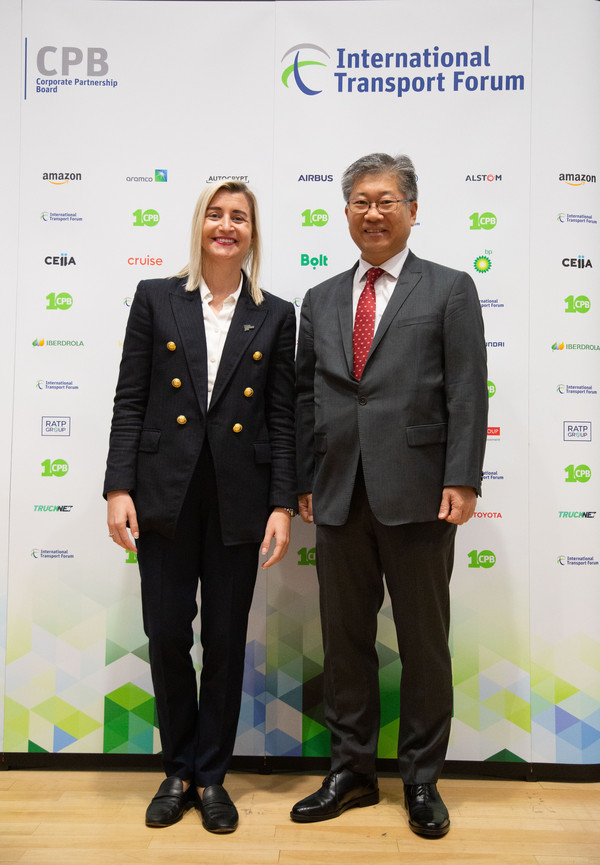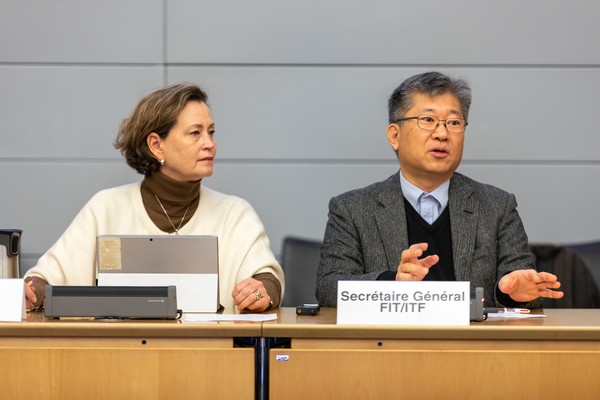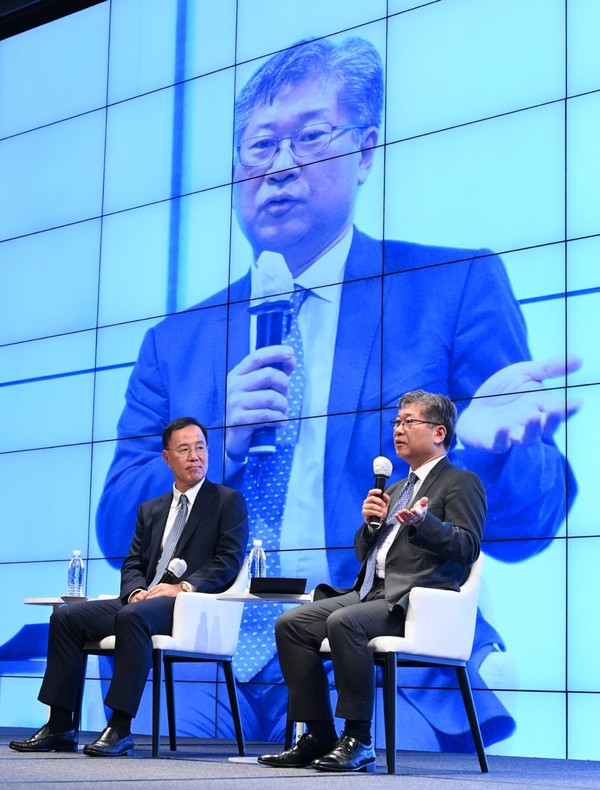
Transportation plays a very important role in our lives and is becoming more prominent in the global era. In transportation, each country has its own interests. Reflecting this, there is an international organization trying to coordinate these varied interests and provide peaceful and better transportation. This time, an SMT reporter met Kim Young-tae, Secretary-General of the International Transport Forum (ITF), who has a positive influence in the global world.
Please tell us about yourself before the interview.
Hello, my name is Kim Young-tae. I have been serving as the Secretary-General of the ITF since 2017. Last year, I was invited to give a special lecture at Sookmyung Women's University. I felt happy to meet future global leaders and share my experiences and feelings. It is great to meet SMWU again through this interview.
For some students who are not familiar with the ITF, please explain about it.
There are many kinds of international organizations in this world. For example, the UN and the EU get a lot of attention, but their role is to make regulations that their respective member states must abide by. On the other hand, the ITF is an organization that leads the dialogue to set certain policy directions for the future rather than making regulations, as the word "forum" demonstrates. It is the only organization in the world that is dealing with all modes of transport. It was founded in 2006 and has 66 member countries. The Summit is held in Germany every May, and it is progressing further by inviting the ministers of not only member states but also non-member states to discuss how to guide future transportation.

After graduating from Yonsei University's Department of Public Administration, you passed the Public Administration Examination in 1993 and worked at the Ministry of Land, Infrastructure and Transport until 2017. It seems that you have followed the standard path of administration. What made you pursue the career of a public servant?
When I was young, my dream was to become a diplomat rather than a public servant. My father told me that becoming a public servant was a stable path, so I entered the Department of Public Administration at Yonsei University and took the public administration exam as planned. However, I always had a desire to work in the global field at the back of my mind. Therefore, even while working as a public servant, I went to France to study and obtained a doctorate, and then went to the United States to work at the Embassy of the Republic of Korea in the USA. As a public servant, I had to focus on domestic area but I was not limited to it, and I tried to move on.
It seems that you have continued to embrace aspirations to go global. What motivated you to have such aspirations?
When I was young, in the 70s and 80s, Korean society was more closed than open. There was no freedom to travel abroad, and there was no way to experience foreign countries indirectly because the Internet was very limited. My father was a Korean Air Force pilot, so I grew up inside the airbases. At that time, airbases were shared with the U.S. military, so I was able to naturally encounter foreign cultures little by little before others. This made me curious about other countries since I was young. I also worked as a reporter for The Yonsei Annals, an English newspaper of Yonsei University, and continuously developed a global sense. Those things grew naturally.
You were selected as a French government scholarship student, and in 2002, you obtained a doctorate in policy from the Paris School of Political Science. Was there a particular reason you chose France?
At that time, there were government's programs that provided overseas education to those who had entered public office. If they were selected due to the exam, they could indeed go, and at that time, it was a trend to go to Anglo-American regions. However, I thought that if I followed the path everyone else had taken, I would just be one of many in a crowd. I went to Paris, thinking that maybe by following the path that others do not take would make me different.

The process of going to a foreign country and obtaining a doctorate degree doesn't seem like an easy path to take. What were your difficulties in the process?
I went to France, and it was almost like pioneering a new world. There were few Koreans there at the time, and the language problem came as a difficulty. When I was a university student, I had studied French literature as a minor, but it wasn't helpful at all in that life. I was also in financial difficulty for about two to three years when Korea experienced the IMF crisis in 1997. In addition, unlike the UK or the United States, there were no exam banks for any subjects, and there was not much mentoring among students, so it took a long time to get a doctorate.
After working in a domestic institution, you became the first person in a non-European country to hold the position of secretary-general. We are curious about your motivation and the process of how you came to hold this position.
I remembered my childhood dream of becoming a diplomat. In addition, I realized that Korea's status is rising very quickly, but the rate of talented Korean people entering international organizations is very low. For these reasons, I began to think about joining an international organization. At first, I applied to some other institutions but failed a few times. Fortunately, however, I became secretary-general in 2017 due to some of my existing skills, such as French language fluency. The puzzles I had created in the past could be drawn into a complete picture to realize my future dream.
What do you think is the most important part of your position as secretary-general of an international organization?
In diplomatic terms, there is bilateralism, which concerns the relations between two countries, and multilateralism, which more than two countries. International organizations are mostly multilateralist. The difficult and important point of multilateralism is that countries participate with different interests. From a realistic point of view, peace is a state in which interests meet and power is balanced. It is the role of international organizations to ensure this balance is not broken, and it is the most difficult responsibility for the leaders who are coordinating it. In addition, it is important to remain politically neutral during this coordination process.

The burden of holding the important position of secretary-general in such a large international organization is likely to be heavy. We wonder how you are handling this weight well.
While working as the secretary-general, the experiences I gained while working as a public official in Korea and the training I received provide support for my work now. International organizations are often criticized for being ownerless. The Korean civil service organizations are controlled from the outside such as the media and the National Assembly. On the other hand, international organizations do not have such control, so they are subject to change depending on the leader's philosophy and decisions. The experiences, values, and training I gained in Korea are now a great help to lead our organization.
In Korean society, finding solutions for accidents related to public transportation is considered a public interest. Public transportation in Korea still seems to have a lot of room for improvement. We are curious about your opinion on Korea's transportation system.
I have traveled and worked around the world, and my conclusion is that Korea's transportation infrastructure is quite developed. Paris has more than 100 years of subway history, but there are not many facilities for the disabled and elderly to move around with ease such as elevators or escalators. In the case of metropolitan railways, they are often stopped or undergoing repair to the extent that one needs to check whether they are running properly every morning. In Korea, on the other hand, it seems to reflect the spirit of being dynamic, pursuing faster and better, and disliking remaining stagnant. Therefore, there seems to be a perception that we always want something better, and that if it becomes even a small problem, we need to fix it. I think this is a very good thing.
Is there a part of the transportation system that can be called a challenge not only in Korea but also around the world?
Now that the world is going through growing pains, we are seeing a lot of things that we did not see in the past. In the early 1990s, building new airports and highways at a rapid pace was a hot topic. But now, what we need to think about is climate change. How to deal with pollution while using fewer fossil fuels is an important task. Also, in the past, transportation was a male-centered area. However, nowadays, devising methods to ensure women's comfort while using transportation services is emerging. The new challenge for transportation is leaving behind male-centered thinking.

It seems to be a meaningful attempt to escape from male-dominated thinking in the transportation sector. We wonder if there's a more specific project going on in this regard.
The ITF has been actively and consistently supporting international organizations such as the Women's Forum to discuss gender since I became secretary-general. In particular, I am aware of the problems with male-centered decision-making and infrastructure design in the transportation field. However, men cannot change this male-centered thinking in this field alone. In terms of employment, I think a compromise can be reached only when many women sit together with men in high-ranking positions where decisions can be made through an understanding of women's needs and specialties.
Among Sookmyung Women's University's students, there are likely to be many who are interested in finding employment in international organizations. We wonder about the ways to do this.
The advantage of working for an international organization is that people can work in any country they like, and the salary and working environment are certainly of a high standard. Due to this, the competition rate is very high—approximately 150:1—so the path can be difficult. My advice here is to join an international organization as an intern, leave a good image of yourself, and gain good experience there. Most international organizations such as the OECD provide opportunities for internships to students, and there is a program in which the Ministry of Foreign Affairs sends students to them. I recommend looking for these opportunities. Individually, one could also register on a database for potential interns through an international organization's website. It will be very helpful to make yourself known by starting on the global stage and joining an international organization.

Finally, do you have any advice for Sookmyungians who want to go into diverse fields?
Your dreams are what determine your life. The types of dreams are important, but how big they are is more important. If you have a global mind and aim for an international organization, even if you do not achieve it 100 percent, you will end up in a stronger position than those who have a small vision from the beginning. I want to remind you that vision is always the first step in determining your achievements and development. Also, make sure that you have varied options in the next five years. If you have only one option, you will be led only by that choice.
KIM YOUNG-TAE
- Yonsei Univ., (B.A.) Department of Public Administration (1991)
- Seoul National University Graduate School., (Integrated M.A.) Department of Public Administration (1995)
- Institut d'Études Politiques(IEP) de Paris., (Ph.D.) Department of Policy Studies (1998 ~ 2002)
- Working in Ministry of Land, Infrastructure and Transport (1994 ~ 2017)
- Embassy of the Republic of Korea in the U.S.A. (2010 ~ 2014)
- Secretary-General of the ITF (2017 ~ present)


